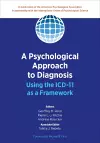
A Psychological Approach to Diagnosis
4 contributors - Paperback
£46.00
Geoffrey M. Reed, PhD, is professor of medical psychology and director of the World Health Organization Collaborating Center for Research and Capacity Building for Global Mental Health, Department of Psychiatry, Columbia University Vagelos College of Physicians and Surgeons. He is also a consultant to the Department of Mental Health and Substance Use, World Health Organization (WHO) and works closely with the National Institute of Psychiatry Ramón de la Fuente Muñiz, Mexico, where he was a founder of the Center for Global Mental Health Research. He is a Level III Member (highest level) of the National System of Researchers, National Council of Science and Technology, Mexico.
Dr. Reed was based at WHO in Geneva between 2008 and 2016, where he was the senior project officer for the development of the classification of mental, behavioural, and neurodevelopmental disorders for the Eleventh Revision of WHO’s International Classification of Diseases (ICD-11). His numerous awards include the Robert L. Spitzer, MD, Memorial Award for Outstanding Contributions to Nosology and Diagnosis, Department of Psychiatry, Columbia University Medical Center and the 2021 American Psychological Association Award for Outstanding Lifetime Contributions to Psychology.
Pierre L.-J. Ritchie, PhD, is professor emeritus in the School of Psychology at the University of Ottawa. He was previously responsible for clinical training in the School’s PhD program in clinical psychology and also served as director of the Center for Psychological Research and Services. He served as the main representative for psychology to the World Health Organization from 1997 to 2016. In this role, he was closely involved in the inception and implementation of the plan for the revision of the classification of mental, behavioural, and neurodevelopmental disorders for the Eleventh Revision of WHO’s International Classification of Diseases (ICD-11).
Dr. Ritchie has extensive leadership experience in the governance and management of national and international organizations as well as in health policy. He served as CEO of the Canadian Psychological Association and as executive director of the Canadian Register of Health Service Psychologists as well as a member of the Council of Representatives of the American Psychological Association. He was the longest serving secretary-general of the International Union of Psychological Science (1996-2012).
Andreas Maercker, PhD MD, is professor of Psychopathology and Clinical Intervention at the University of Zurich, Switzerland, and codirector of the department’s outpatient clinical services. Dr. Maercker was president of the German-speaking Society for Traumatic Stress Studies and subsequently held leading positions in the European and International Societies for Traumatic Stress Studies. He has chaired various committees and sections on research ethics and clinical psychology in the German and Swiss Psychological Associations and the European Association of Clinical Psychology and Psychological Treatment, which he co-founded in 2017. His ongoing research interests include e-mental health interventions and cultural clinical psychology.
From 2011 to 2019, Dr. Maercker chaired the WHO Working Group responsible for developing proposals for the revision of trauma and stress-related disorders in the ICD-11. He has been awarded the Swiss Prize for Anthropological and Humanistic Psychology and the Wolter de Loos Award for Distinguished Contribution to Psychotraumatology in Europe from the European Society for Traumatic Stress Studies.
Tahilia J. Rebello, PhD, is assistant professor of Clinical Medical Psychology and research program manager of the WHO Collaborating Center for Research and Capacity Building for Global Mental Health, Department of Psychiatry, Columbia University Vagelos College of Physicians and Surgeons. She also served as consultant to WHO’s Department of Mental Health and Substance Use from 2013 to 2018.
For over a decade, Dr. Rebello managed the implementation of the systematic program of more than 20 multilingual internet-based field studies that tested and strengthened the reliability, clinical utility, and global applicability of the ICD-11 classification of mental, behavioral, and neurodevelopmental disorders. Dr. Rebello also managed the expansion and engagement of WHO’s Global Clinical Practice Network, now consisting of more than 18,000 mental health and primary care health professionals from 164 countries, which contributed to the ICD-11 directly by participating in these studies. She played a leadership role in the design and development of a comprehensive online training program for global clinicians aimed at facilitating the integration of ICD-11 into clinical practice across the world (gmhacademy.dialogedu.com/icd11).